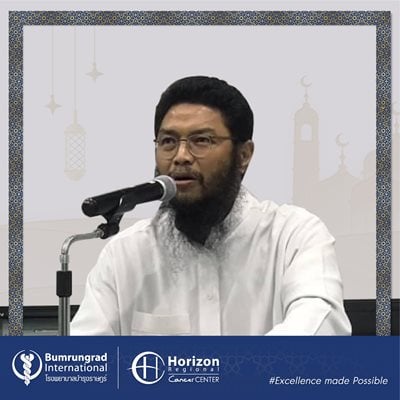“Faith in the treatment, steadfastly practicing their faith, good spirits, and plenty of rest; these are the factors that bring the patients mind, body and spirit into balance. This is corroborated by research on the medical benefits of religious faith. For us, Islam is actually a way of life, a set of practical guidelines laid out in scripture.” These are the views that
Dr. Surasit Saleh Issarachai, an oncologist and hematologist at Bumrungrad Hospital, has on combining the practicalities of modern medicine with a faith-based attitude.
Dr. Surasit specializes in treating solid tumor cancer in organs such as the
lungs,
liver,
breasts, etc. with
chemotherapy. “During my studies and professional tenure in the USA, I discovered a passion for the science of treating cancer and blood-related illnesses. As an international hospital, Bumrungrad has well defined specialisms, each with a deep well of professional experience. This appealed to my professional sensibilities. When I returned to Thailand, I became an oncologist at Bumrungrad Hospital, where I am responsible for the care of Arab patients.”
“Different patients may have the same disease, but that’s often where the similarities end. Differences in genetics and ethnicities can result in different treatment outcomes. What’s medicine for one patient may be poison to another. That’s why my treatment plans are based around the ‘
individual medicine’ concept.” This kind of treatment requires much attention to detail, forethought, and convergent problem-solving from the physician to find the most suitable treatment approach for the patient.
“I see patients at all ends of the cancer spectrum, from early-stage to the final stage. Mostly, they come to me after other treatment modalities have already failed. In some cases, the patients are practically begging to go straight to palliative care, because they’ve already lost faith in the treatability of their condition. Nevertheless, I insist on personally giving their treatment another shot, giving it all I’ve got. We have the advantage of highly targeted treatment, aided by a constant, up-to-date feed of information. We also have ready access to the most cutting-edge treatment paradigms, so that our patients have all of the best options laid out before them.”
Faith heals the body with the spirit

“If my patient is open to talking about their faith, I often ask them to review and reconsider their lives for things that they would have done differently, given the chance. If there is anything that needs to be taken care of, or things that need to be said, now is the time for them to take care of it. During the final stage of cancer, most people tend to regard their lives as practically over. But I tell them that they are receiving treatment that’s making them better. And if today is better than yesterday, they are already ahead. They ought to use the time that they have to clear things up in their family, to right any wrongs that they may have on their mind, and to do good from that point onwards.” This is a stalwart of Dr. Surasit’s practice. “For me, honoring the tenets of Islam does not mean turning our backs on modern science. I believe that saving lives, maintaining faith, and maintaining lineage are not mutually exclusive. However, if it is a choice between death and non-halal medication, then the life-saving choice is always the right choice.”
The relationship between the patient’s family and the doctor is also very important. “Confidence in the physician is crucial. If the trust is established, communication will flow smoothly. The patient and their family will come to a better understanding of their condition, and many problems can be circumvented. This level of confidence must also be treated ethically, and with respect. I always ask my patients first, whether they are ready to commence treatment with me. If they are not comfortable with having me as a physician, I am all too happy for them to see a different doctor. Trust and communication directly translate into good treatment outcomes.”
Extending time
“There was a patient from Myanmar, around 70 years old, who had
stomach cancer. He could not even swallow because his stomach was all blocked up with tumors, which had spread to the lymph nodes and liver. A PET scan showed that his liver was absolutely riddled with cancer. However, his genetic markers give us clues for other approach that could give him a fighting chance. Anti-HER2 antibodies and anti-HER2
targeted therapies were prescribed, along with a reduced dose of chemotherapy, because the patient was already weakened from previous treatments, and his aged physical body had to be treated with a great deal of care,” Dr. Surasit said. “Three to four years passed, and the patient is still alive. A scan of his liver did not show any cancer cells at all. It is very encouraging for us to see what can be achieved by the right medication, the right treatment and a trust given to us by the patient. Not only did the patient get their life back, they got their family back too.”
To find the beauty underneath
“I believe that chronic illnesses, which I take to include cancer, are a test from above. There are always two sides to these tests; we may feel beleaguered and in great agony from the disease, we may not even be able to see the light at the end of the tunnel. But if we quiet our minds a little and gather our wits, we will be able to see the beauty that is hidden in these trying experiences. I’ve seen families riven with great emotional distance pull together when one of them is struck with life-threatening cancer. They come to see the doctor together, they repair their relationships with each other, and open their hearts to one another even wider than before, all to bring one family member back from the brink of death,” Dr. Surasit concludes.
For more information please contact:
Last modify: August 22, 2023